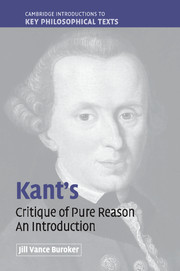Book contents
- Frontmatter
- Contents
- Acknowledgments
- List of abbreviations
- 1 Introduction to the critical project
- 2 The Prefaces and the Introduction
- 3 The Transcendental Aesthetic
- 4 The Metaphysical Deduction: identifying categories
- 5 The Transcendental Deduction of the categories
- 6 The Schematism and the Analytic of Principles I
- 7 The Analytic of Principles II
- 8 Transcendental illusion I: rational psychology
- 9 Transcendental illusion II: rational cosmology
- 10 Transcendental illusion III: rational theology
- 11 Reason and the critical philosophy
- Conclusion: Kant's transcendental idealism
- Works cited
- Index
6 - The Schematism and the Analytic of Principles I
Published online by Cambridge University Press: 05 June 2012
- Frontmatter
- Contents
- Acknowledgments
- List of abbreviations
- 1 Introduction to the critical project
- 2 The Prefaces and the Introduction
- 3 The Transcendental Aesthetic
- 4 The Metaphysical Deduction: identifying categories
- 5 The Transcendental Deduction of the categories
- 6 The Schematism and the Analytic of Principles I
- 7 The Analytic of Principles II
- 8 Transcendental illusion I: rational psychology
- 9 Transcendental illusion II: rational cosmology
- 10 Transcendental illusion III: rational theology
- 11 Reason and the critical philosophy
- Conclusion: Kant's transcendental idealism
- Works cited
- Index
Summary
The final stage in justifying the categories consists in Kant's arguments for the synthetic a priori principles correlated with them. In the Analytic of Principles, Kant defends these metaphysical principles, including those of substance and causality that Hume attacked. As mentioned earlier, he also added to the B edition the argument titled the Refutation of Idealism, aimed at Descartes's view that knowledge of physical reality is less certain than self-knowledge. Thus it is here rather than in the Transcendental Deduction that Kant responds directly to the skeptical challenge.
The first chapter of this section, the Schematism, forms a bridge between the Transcendental Deduction and the arguments for the principles. It explains how pure concepts of the understanding, which have no original connection to sensibility, can apply to objects of intuition. The schema of each category is the condition relating the pure concept to spatiotemporal objects. It provides the empirical content that turns the syntactic concept into a real concept of an object. Contrary to the view of many commentators, this chapter is not incidental to Kant's argument. As Allison points out, the Transcendental Deduction shows only that the categories apply necessarily to objects given in time. But from that argument no particular metaphysical propositions can be derived. The Schematism specifies the particular temporal condition connected with each category. In particular, it describes how the productive imagination mediates between the understanding and the sensibility.
- Type
- Chapter
- Information
- Kant's 'Critique of Pure Reason'An Introduction, pp. 136 - 162Publisher: Cambridge University PressPrint publication year: 2006



